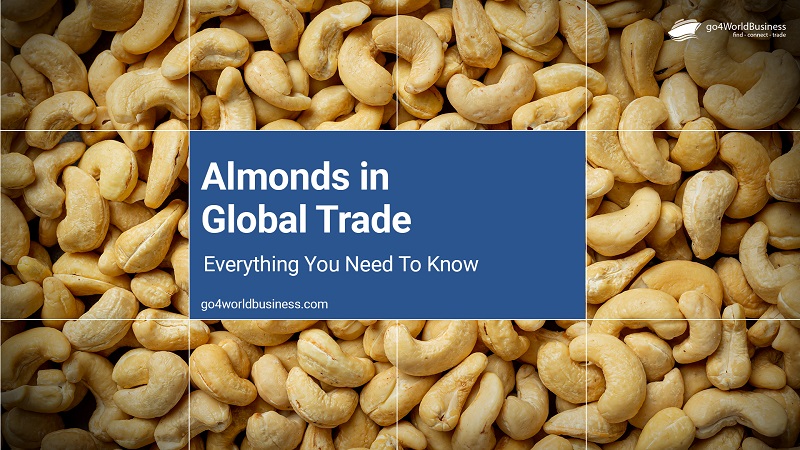

You might think of cashews as just a healthy snack, but these nuts play a big role in global trade. Cashews are seeds that grow at the bottom of a unique fruit called the cashew apple (a juicy, pear-shaped fruit). These fruits come from the cashew tree, native to Brazil. Interestingly, Portuguese explorers first introduced them to India and Africa in the 16th century, and today these countries are among the major producers and exporters of cashews. You might not know that the shell around a cashew nut contains a naturally toxic oil, so the nuts have to be carefully processed before they can be eaten. One of the best qualities of cashews is that they are incredibly versatile. They are used in creamy vegan cheeses, rich curries, baked treats, and even for making oil that is used in cooking and some industrial applications. Today, cashews are a high-demand commodity worldwide, connecting exporters, suppliers, and cashew buyers across continents. From bulk cashews to specialty varieties, the market continues to grow as more people discover the delicious taste and nutritional value of these nuts. If you are a supplier looking for cashew buyers, here you will learn everything you need to know to grow your exports and maximize your profits.
Like other nuts, cashews are categorized by grading standards, mainly based on size and quality. Moreover, they are also available in various processed forms, such as raw, roasted, salted, flavored, and in different pieces like whole nuts, halves, and bits. To meet buyer requirements, you should be familiar with these cashew varieties and grades. Here are the most popular and commonly traded types of cashews, and their export value in the global market.
Exporting a full range of cashew or cashew nuts varieties will allow you to reach wider markets and maximize your market share. From cashew kernel and raw cashew nuts to roasted cashews, salted cashews, and cashew nut oil, every product category offers unique opportunities for exporters. Popular grades such as W320 cashew nuts, W240 cashew nuts, and W180 cashew nuts are especially in high demand worldwide, making them valuable for both bulk trade and premium markets. Apart from these, you can further grow your exports and increase profitability by extending your portfolio to include other dry fruits & nuts such as:
Your export business growth often depends on market trends, dynamics and regional demand. Thus, it is very important to stay updated on developments in the global commodity trade to make informed decisions for your business. From market size and top cashew importers to price trends and buyer preferences, here are the key insights you should know.
Cashew Global Market Size Data:
Source: IMARC
Top Cashew Importers Worldwide:
Source: Volza
Cashew Nut Price Trends:
The cashew price per kg varies based on the grade, size, and market conditions. Currently, the global wholesale price of cashew nuts usually ranges from $1.06 to $1.90 per kg. In addition, understanding price trends from recent years can help you predict future prices. Here are the cashew nut price trends for the past years.
Source: Tridge
What Cashew Buyers Prefer:
Whether you are new to the export business or already established, finding verified cashew nut buyers can be challenging if you don’t know the right methods. You can connect with buyers and importers looking for bulk cashews through the following proven strategies:
?
1. Which countries are the largest importers of cashews?
Vietnam, the United States, and India are the top cashew importers worldwide.
2. What are the primary types of cashews traded?
Buyers usually trade whole kernels, splits, butts, pieces, raw cashews, roasted cashews, salted cashews, and cashew nut oil. Popular grades include W180, W210, W240, and W320.
3. What regulations and certifications are important for cashew exports?
Buyers look for certifications like FSSAI, HACCP, ISO, and Organic labels. You also need to follow food safety rules, proper packaging standards, and export documentation.
4. What is cashew nut shell liquid (CNSL)?
CNSL is a toxic oil extracted from the cashew shell. Industries use it to make paints, varnishes, lubricants, and resins.
5. What is the rank of India in cashew export?
India ranks among the top 3 global cashew exporters, alongside Vietnam and Ivory Coast, supplying both raw and processed cashews worldwide.
6. What is the cashew capital of the world?
Mangaluru in Karnataka, India is known as the “Cashew Capital of the World”.
7. Which state has the cheapest cashews in India?
Kerala often has the most affordable cashews because of local production and processing hubs.
8. Where to find cashew buyers?
You can find buyers through B2B marketplaces (like go4WorldBusiness), trade fairs (Gulfood, Anuga, World Cashew Conference), industry councils like CEPCI, social media channels like LinkedIn, and online searches using long-tail keywords like ‘cashew buyers near me’ or ‘international cashew importers’.
9. What is the cashew HSN code?
0801 is the main cashew HSN code. For raw cashew nuts, the specific code is 080131.
10. What is the cashew price per kg?
Global wholesale prices usually range from $1.06 to $2.00 per kg. However, it can vary depending on grade, size, and market conditions.
Ivory Coast is boosting its cashew production to 1.3 million tons, but a 21% U.S. tariff and reduced demand from Vietnam are creating major export challenges. (Full Story: Reuters)